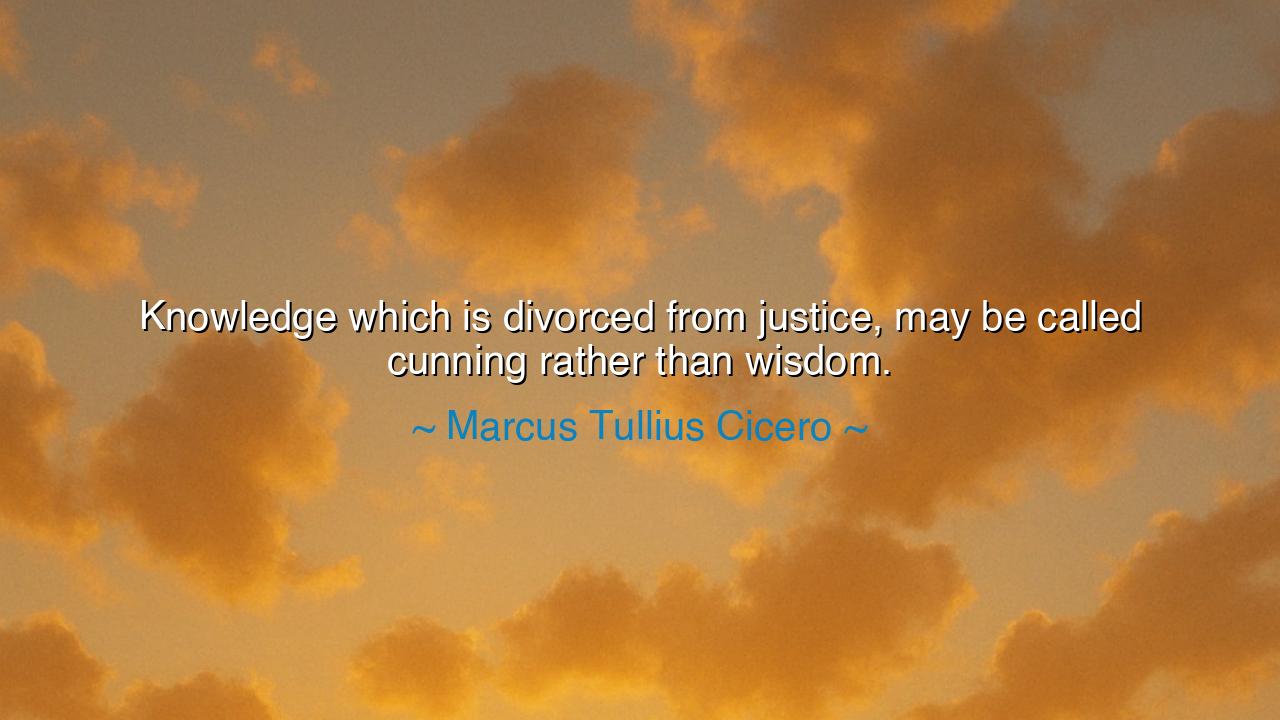
Knowledge which is divorced from justice, may be called cunning






“Knowledge which is divorced from justice, may be called cunning rather than wisdom.” — Marcus Tullius Cicero
Hear now, O children of thought and conscience, the voice of Cicero, the great Roman orator and philosopher, whose words have echoed through the corridors of time. In this saying, he speaks to the very heart of human virtue — to the sacred bond between knowledge and justice. For knowledge alone, though mighty in its power, is blind without righteousness. When knowledge strays from justice, it becomes deceit; when intellect abandons virtue, it becomes cunning, a shadow of true wisdom. Cicero warns us that the mind, when divorced from the moral heart, ceases to illuminate and begins to manipulate.
The origin of this truth was forged in the turbulent days of the Roman Republic. Cicero lived in an age when corruption had seeped into the veins of the state — when clever men used their eloquence not to defend the law, but to twist it; when ambition masked itself as patriotism, and reason served greed. Cicero, standing amidst this moral decay, saw that intelligence ungoverned by virtue was the most dangerous force of all. It was not the fool who destroyed nations, but the brilliant schemer — the man of knowledge without justice. And so he declared: wisdom must walk hand in hand with righteousness, or it becomes nothing more than cunning in a cloak of reason.
Think of the difference, my child, between wisdom and cunning. The wise seek harmony, the cunning seek advantage. The wise act for the good of all, the cunning for the gain of self. The wise speak truth to uplift, the cunning speak it to deceive. Both may appear intelligent, but one’s heart is pure while the other’s is poisoned by pride. Cicero saw clearly that knowledge is a double-edged sword: it can build or destroy, heal or wound, depending on the hand that wields it. Thus, it is justice — the moral compass of the soul — that guides knowledge to righteous ends. Without it, even the most learned man becomes dangerous.
Look to history, and you will find Cicero’s wisdom written in blood and triumph alike. Consider the tale of Oppenheimer and the dawn of the atomic age. The scientists who split the atom unlocked the very fire of creation — a marvel of human intellect. Yet that same knowledge, untempered by justice, unleashed destruction upon Hiroshima and Nagasaki. Knowledge had triumphed, but wisdom had not prevailed. It was then, in the glow of a burning sky, that humanity learned anew Cicero’s lesson: that knowledge without justice is not enlightenment, but peril — not wisdom, but cunning exalted to catastrophe.
Even in daily life, this truth whispers its warning. The cunning man may rise quickly, for he knows how to charm, how to manipulate, how to take what he desires. But his triumphs are short-lived, for they rest upon deceit. The wise man, though slower to ascend, builds his path on the solid ground of honor, and his legacy endures. For time itself is the enemy of cunning, but the ally of justice. What is built on falsehood crumbles; what is rooted in truth stands firm through the ages. Thus, Cicero’s words are not only a warning to the mighty, but a teaching for all who walk the path of learning.
The lesson is clear: seek not to be clever, but to be just. Let your knowledge serve goodness, not vanity. When you learn, ask not only “What can this do?” but “Should this be done?” When you speak, let your words uplift rather than wound. When you act, let fairness guide your hand more than gain. For cleverness without conscience is like a ship with no rudder — swift, but destined for wreckage. True wisdom lies not in the sharpness of mind, but in the purity of heart that directs it.
Therefore, my child, if you would be wise, wed your knowledge to justice, as the heavens are wedded to light. Study deeply, but live righteously. Seek truth not as a weapon, but as a mirror — one that reflects the divine order within your own soul. Remember that even the gods favor the just over the clever, for cleverness may conquer kingdoms, but justice alone builds civilizations that endure. And when your time comes to speak or to act, let your words and deeds bear this seal: wisdom born of justice, for only then will your knowledge serve the good, and your legacy shine with the eternal light of truth.






AAdministratorAdministrator
Welcome, honored guests. Please leave a comment, we will respond soon